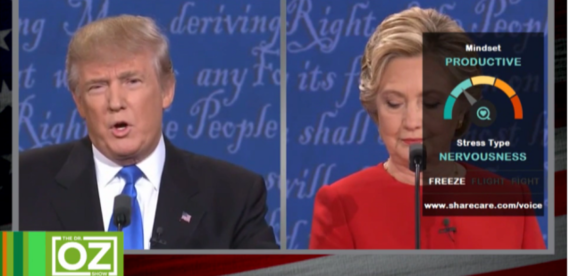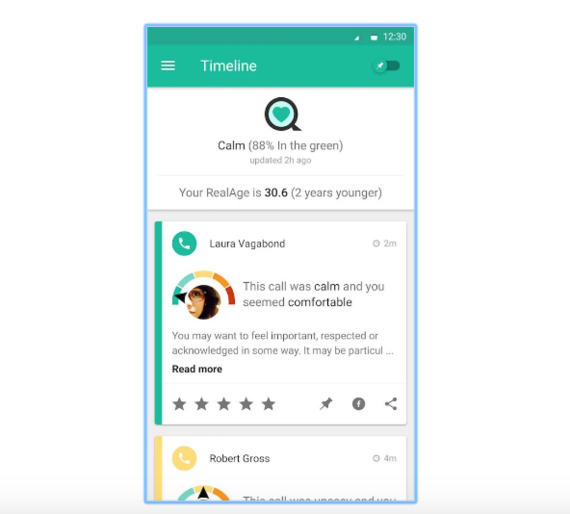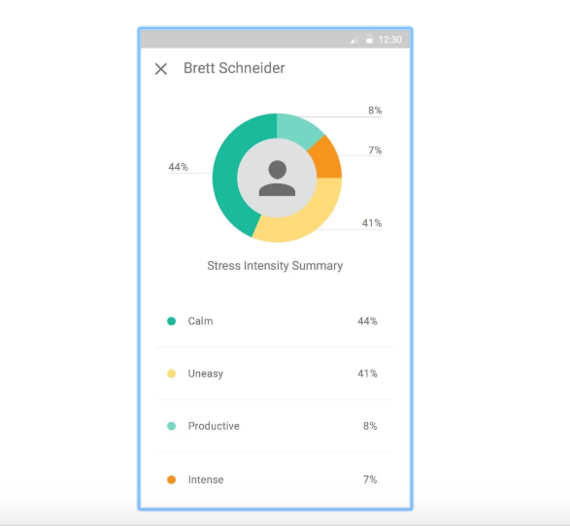Co-written by Erik Feingold, chief innovation officer of Sharecare
The presidential election is only two months away and the race continues to heat up. More than 80 million people watched Monday night's debate, more than any debate in television history. While there has been significant analysis of what both candidates said, what it meant, and how accurate it was, there has been little discussion of the way they said it.
It turns out that by measuring the stress in a voice we can get information at the nexus of physical and emotional well-being. In most cases though, our powers of deduction are not sensitive enough to detect the subtleties in a voice that give us a clear view into a speaker's true emotions. But a new technology, developed by Sharecare, allows us to do a fractal analysis of our voice in real-time to tell us a lot about our levels of stress. This has great implications for understanding your health, but also comes in handy for understanding more about our presidential candidates when applied to how they handle themselves in the debate. (You can watch the app's analysis of the debate here.)
The app measures both a person's level of excitability or mindset in a specific situation from calm to very intense as well as a person's stress type at that time. During the course of Monday's debate, Donald Trump was overall more often stressed than we've seen in the voice analysis we've done of the previous primary debates. This may be because of a very interesting phenomenon we see with Mr. Trump. When he is directly attacking his opponents his levels of excitability remains low or productive. In other words, he appears very comfortable with this type of behavior. However, his stress levels peak when he attacks the issues or the status quo, suggesting that these issues are more emotionally reactive for him. For example, on Monday when he discussed stop and frisk and the loss of jobs he showed high impatience and worry and became outright irritated when fighting ISIS came up. In this week's debate with Secretary Clinton, he discussed these issues more than in the previous debates, which could account for why he became stressed more often on Monday night.
We also see an interesting pattern in the analysis of Secretary Clinton's voice that is very different than what we see with Mr. Trump. She is less stressed when discussing issues and gets more emotionally charged, and stressed, when confronting her opponent. According to the algorithm used by Sharecare's technology, Secretary Clinton had high levels of stress and became very irritated when she attacked Mr. Trump's comments on women or when she suggested he was living in his own world with regard to his views on past trade agreements.
However, when Secretary Clinton was debating the issues, such as the economy, her level of excitability was low or productive and she was merely nervous and impatient. So it turns out in this debate Secretary Clinton was actually more stressed than in her previous debates with Bernie Sanders, likely because in those debates the candidates spent more time debating the issues, rather than each other's merits.
While both candidates had very different stress responses toward each other and toward the issues through the debate, both were hitting their individual emotional highs and lows and both were able to find their balance. It will be interesting to see if their patterns change in their next meeting. The science of voice analysis gives us a fascinating look into the emotions of both candidates, but when it comes to what that means for their candidacy, we'll leave that to the pundits.
If you'd like to analyze your own voice and relationships, you can try the Sharecare app yourself. Go to www.sharecare.com/voice to check it out. You can also watch our voice analysis from the previous debates here and here.


